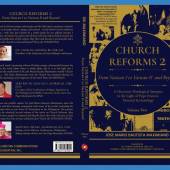Let there be peace on earth…

In the wake of Holy Week 2022, Pope Francis pleaded for an Easter truce between Russia and Ukraine.
The plea of course fell on deaf ears, with Putin pressing on, capturing city after city, and how! His brutish soldiers are reportedly having the time of their lives as they go about raping and killing women with impunity. Thus, Russia, despite being an Orthodox Christian country, under the Presidentship of an Orthodox Christian named Vladimir Putin, broke practically every single one of the Ten Commandments.
Luke’s parable of the Good Samaritan, seen in a wider context, is by far the finest example of Christian neighbourliness, nay humanness which the likes of Putin need to learn to emulate. However, translated into the modern idiom, the implications are so vast as to call for a re-definition of the terms “neighbour” and “neighbourliness” that reflect the mindset of one of the most judicious and pragmatic reformers of all time, Jesus Christ no less! Not for Jesus, the hollowness of a religion practised by the Pharisees in Jewish society. Not for him the peace of the grave that marks relationships between neighbours. This is where the peace agreement signed on 12 June 2018 by Trump and Kim comes in. The Japan-colonized Korean Peninsula was divided in two following Tokyo's surrender at the end of World War II, with the Soviet Union occupying the North and the US the South. The hostilities that have prevailed ever since between the two halves, formally ceased with the historic summit between President Donald Trump of the US and his North Korean counterpart, Kim Jong-Un at the Capella Hotel on Singapore’s Sentosa Island.
Culture of Good neighbourliness
In the kind of environment we face, saturated by the “apartment” culture which we have willy-nilly become part of, what exactly is it that constitutes good neighbourliness? To arrive at a satisfactory answer, we would need to look closely at what constitutes good neighbourliness and what doesn’t. Indeed, what makes for bad neighbourliness is multifold, the chiefest of all being covetousness! And Putin’s sin is precisely that.
Reportedly unable to swallow the bitter pill of the disintegration of the former USSR to this day, Putin desired one of the nearest fragments of the extant confederation and moved in shamelessly to appropriate it by hook or by crook. How the man can get even a 40-wink sleep with the world watching with bated breath the mindless rape-&-kill tamasha in evidence is anybody’s guess. Obviously sharing in Putin’s guilt in great measure is Kirill I, Patriarch of the Russian Orthodox Church since 2009.
Eastern Orthodoxy is Russia's largest religious denomination, and its leader, Kirill, has been known to have staunchly supported Russia's invasion of Ukraine. Said to be extremely close to Putin, Kirill owes it to himself, to the Church he is heading and to the world at large to pull up the President for this serious lapse. How can a priest, much less a patriarch, watch devoid of a glimmer of slightest concern the murderous course a member of his Church is on?
On being neighbour
Being a neighbour has a wide dimension that embraces not merely the person next door per se but in another part of the neighbourhood, nation or country in a different part of the world. Not everyone might be enamoured of Trump; neither would many be enthused about peace in relation to Kim who is known to feed humans alive to animals. But at least for the record, if not for the photo-op, peace between two sovereign nations does deserve to be given a chance.
Could it be that it is easier to be neighbour to someone living miles away rather than to someone living next door, as is evident in the on-off relationship between next-door neighbours India and Pakistan? It would seem so. And yet, it isn’t entirely impossible, considering that even though marriages have taken place across the border, the two countries now share much more than just a border. Indeed, numerous are the Saas-Bahu relationships have taken root on either side of the divide. So, why not the peace of good neighbourliness between the two neighbours of any hue whatsoever? Why the greed of covetousness among nations?
The roots of peace
"Let there be peace on Earth and let it begin with me," goes the 1955 song of Jill Jackson Miller and Sy Miller. From calling each other names [Trump a ‘Dotard’, Kim ‘Little Rocket Man’] to threatening each other’s countries, America and Korea have come such a long way as to be held up as examples of peace-making. Given the grave risks associated with threats that involve the use of nuclear arsenal, with Trump once having declared that “no regime has oppressed its own citizens more totally or brutally than the cruel dictatorship in North Korea,” it is immaterial who among the two made the first move or even how the move came about at all. What does matter is that they decided to bury the hatchet and begin afresh by being neighbour to each other, Trump then vowing to denuclearize the zone around Korea.
The lesson ensuing from such a scenario is too significant to be overlooked: for lasting peace on one’s country’s borders, one must be ready for a gracious give-and-take that is implicit of grace having its sway over our hearts and our homes, allowing it to cover our neighbourhoods and cities, our countries and continents and thence, the whole world! Whether President Vladimir Putin will rise to his full stature and face the challenge squarely by summarily ceasing all hostilities, only time will tell. In the meanwhile, how much longer will the dance of death and destruction be allowed to go on in Ukraine by the international community?
Radio Veritas Asia (RVA), a media platform of the Catholic Church, aims to share Christ. RVA started in 1969 as a continental Catholic radio station to serve Asian countries in their respective local language, thus earning the tag “the Voice of Asian Christianity.” Responding to the emerging context, RVA embraced media platforms to connect with the global Asian audience via its 21 language websites and various social media platforms.














